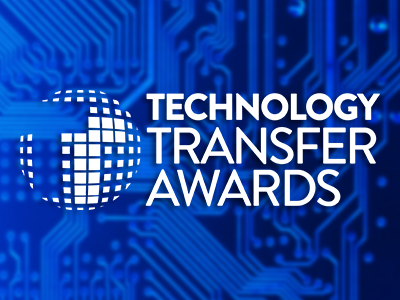The annual EPRI Technology Transfer Awards recognize members who have successfully transferred our research into applied results. The award winners have shown exceptional application of EPRI research and technology in solving a problem of size and significance, championing a technology both with their companies and across the industry, driving progress in the electricity sector, and providing meaningful benefits for their companies’ stakeholders and for society.
EPRI recognizes and celebrates the hard work, commitment, and leadership demonstrated by these award winners to help make electricity more reliable, efficient, affordable, safe, and environmentally responsible.
The Nuclear Power Council Executive Committee reviewed the award nominations, providing their industry-wide perspective, and selected 12 for Technology Transfer awards, recognizing 56 recipients in 17 EPRI member companies worldwide.
Download the published brochure of winners across the institute.
2022 Nuclear Technology Transfer Award Winners
The following videos discuss the 2022 Technology Transfer Awards winners and the EPRI research and technology they applied to produce significant results for their respective companies.

EPRI Contact
- Laura Thompson
- lauthompson@epri.com
Teams Pioneer EPRI’s Guidance on Leveraging Risk Insights for Aging Management Programs, Realizing Greater Safety & Lower Costs
Constellation and Ameren pioneered the application of EPRI’s guidance on Leveraging Risk Insights Framework for Aging Management Implementation, which describes how to use risk insights about the likelihood and consequences of specific failures to create a heat map or risk matrix.
Shandong Nuclear Power Company Realizes Significant Savings Through Successful Evaluation of Fuel Failure in AP1000 PWR Using Guidance from EPRI’s Fuel Reliability Program
Shandong Nuclear Power Company used EPRI’s Pressurized Water Reactor Fuel Reliability Monitoring and Failure Evaluation Handbook to plan and conduct a targeted fuel inspection.
Collaborative Work on an Effective Modernization Strategy Brings Success at Two Nuclear Plants
Utility personnel from Energy Northwest and PSEG demonstrated industry leadership by championing EPRI’s Modernization Strategy Process and providing key input to strengthen the process along the way.
Proactive Application of EPRI’s ASME Code Reconciliation for Flow-Accelerated Corrosion Highlights Substantial Potential Savings
TVA proactively applied the business case and guidance described in EPRI’s ASME Code Reconciliation for Flow-Accelerated Corrosion (FAC) Program—prior to performing an inspection.
Application of EPRI’s Continuous On-Line Monitoring Guidance Results in Improved Maintenance Strategies for 3 EPRI Members
Sanmen Nuclear Power Company, Asociación Nuclear Ascó-Vandellòs, and Southern Nuclear successfully applied a variety of EPRI plant maintenance and modernization guidance to bolster maintenance programs, significantly reduce maintenance and engineering time, boost equipment availability, and cut maintenance costs.
Application of EPRI’s Single Point Vulnerability Process Guide Results in Safer Unit Operation and Substantial Reduced Scram Rate
China National Power Company developed and applied for the first time EPRI’s Single Point Vulnerability (SPV) Process Guide, which allowed the utility to identify scram-vulnerable equipment, analyze subcomponents, and develop mitigation strategies to establish the first comprehensive SPV program in use at a nuclear power plant in China.
Utilities’ Training Efforts Streamlined with Common Industry Training Programs from EPRI
Ameren, Arizona Public Service, Dominion Energy, Duke Energy, and Tennessee Valley Authority supported EPRI’s effort to develop initial maintenance and technical (M&T) training programs that can be used across the industry.
EPRI’s Boron-Induced Offset Anomaly (BOA) Risk Assessment Tool Aids in 2 Major Events
Electricité de France (EDF) successfully used the EPRI Boron-Induced Offset Anomaly (BOA) Risk Assessment Tool between 2020 and 2022 to help deal with two major events at EDF.
EPRI Guidance Reveals System Decontamination Unnecessary, Saving Millions and Avoiding Large Amount of Waste Generation
Taiwan Power Company used guidance from EPRI’s Decommissioning Technology Program to determine it was not necessary to perform a full or partial system chemical decontamination.
EPRI Guidance Helps Save Time and Resources for Self-Assessments of In-Service Testing (IST) and Air Operated Valve (AOV) Programs
Duke Energy used EPRI’s ASME OM Code Mandatory Appendix IV Implementation Guide at its Oconee Nuclear Station to efficiently evaluate and assess new test requirements for active pneumatically operated valves.
A Complete Single-Sided Scanning Technology Demonstration System for AP1000 Units in China is Developed with Help from EPRI Research
Shandong Nuclear Power Company established China’s first complete ultrasonic single-sided scanning demonstration system, which includes examples and guidance for other nuclear power plants worldwide to effectively carry out ultrasonic single-sided scanning demonstrations.
ISI Exam Effectiveness Improved on RVUH Penetration Tubes Using Criteria from EPRI’s Pressurized Water Reactor Materials Reliability Program
Korea Hydro and Nuclear Power Company successfully incorporated EPRI’s Materials Reliability Program guidance in its utility procedures allowing it to address important safety concerns while also avoiding personnel radiation dose.